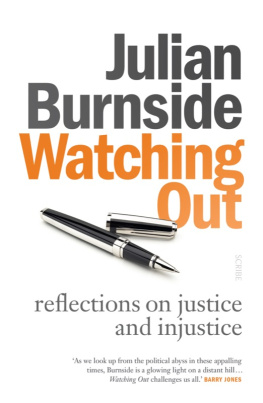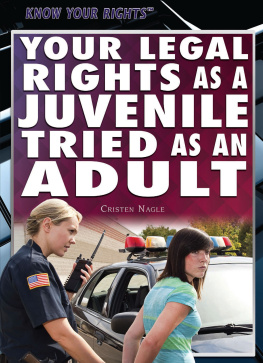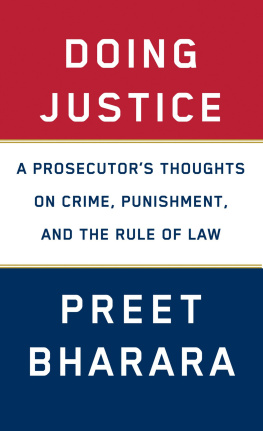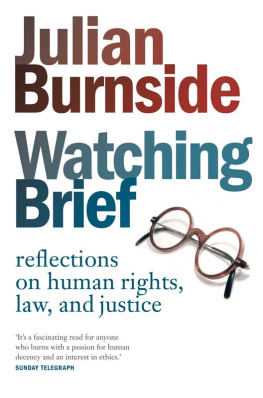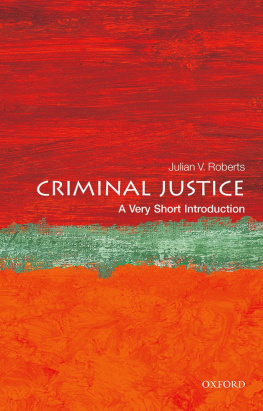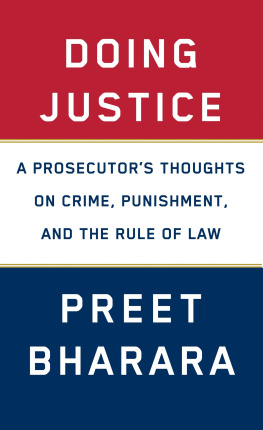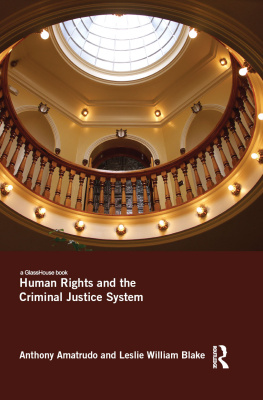
WATCHING OUT
Julian Burnside, QC, is an Australian barrister who specialises in commercial litigation and is also deeply involved in human-rights work, in particular in relation to refugees. He is a former president of Liberty Victoria, and is also passionately involved in the arts: he is the chair of Melbourne arts venue fortyfivedownstairs, and regularly commissions music. He has published a childrens book, Matilda and the Dragon , as well as Wordwatching , a collection of essays on the uses and abuses of the English language, and Watching Brief: reflections on human rights, law, and justice .
Scribe Publications
1820 Edward St, Brunswick, Victoria 3056, Australia
2 John St, Clerkenwell, London, WC1N 2ES, United Kingdom
Published by Scribe 2017
Copyright Julian Burnside 2017
All rights reserved. Without limiting the rights under copyright reserved above, no part of this publication may be reproduced, stored in or introduced into a retrieval system, or transmitted, in any form or by any means (electronic, mechanical, photocopying, recording or otherwise) without the prior written permission of the publishers of this book.
The moral right of the author has been asserted.
9781925322323 (Australian edition)
9781925548501 (e-book)
A CiP entry for this title is available from the National Library of Australia
scribepublications.com.au
scribepublications.co.uk
To Kate:
Without her support, I could not have kept going.
Contents
Appendices
A.
B.
Introduction
T his book does not set out to equip the lay reader to mount his or her own litigation. Neither is it designed to help law students pass their exams or to teach lawyers how to practise law; rather, I hope it will remind some lawyers why we practise law.
Although I try to explain some of the basics of the law and of legal procedure, I do so only to make the rest of the book intelligible. The real purpose of this book is to explore the reasons we have a legal system at all, to look at the way it operates in practice, and to point out some ways in which its operation does (or does not) run true to its ultimate purposes.
WHEN I FIRST contemplated the project of writing this book, I was uncertain what it was to be about. It was not to be an autobiography, or a collection of war stories. It was not to be a legal textbook. I thought perhaps it was to be a book about the justice system.
I told a friend about it. With her solid pragmatism, she pointed out that we do not have a justice system: we have a legal system. But a book about the legal system sounds to me a bit too much like a textbook. And, anyway, I am not sure how much the legal system interests me. I wanted to write about the way our system of justice works. Justice interests me much more than law does. So this is a book about a chimera: a creature that does not exist, but that is real enough in the mind.
Everyone has an instinct for justice. We develop it early. As Tom Stoppard says in Professional Foul , even children in the playground understand justice: their cry Its not fair recognises a truth which precedes utterance. A powerful concern about justice, or indignation at injustice, is a very common trait. It is tempting to say it is universal, but experience makes that difficult to defend. Everyone who is concerned about justice and injustice is likely to have their own, idiosyncratic reasons for it. I have written before a few fragmentary observations about its origins in my own life. But I have not told the whole truth.
As I have written before, in Watching Brief , an experience at school was part of it:
On my last day at school, when the glittering prizes were being strewn among the chosen, I was awarded colours in each of my sports. But I was awarded only second colours, because they were only second-colour sports. I still remember the stinging injustice of it, that for a good footballer the ultimate accolade of first colours for playing a season for the school; yet after representing the school at the highest level for years as a swimmer, and in diving and rugby, I got second best.
If I were to speculate on the origin of my concern about justice I would settle for that day.
That was part of it, but not all of it. As a rather insecure child in a family that was falling apart, decades before such things were normal or socially acceptable, I found life very confusing and uncertain. Above all other things, I needed to understand how life worked, so that I could feel safer. I understood that there were rules about how you were to behave: rules made by government (I knew these were called laws), rules made by school, requirements imposed at home as house rules. Although house rules were the lowest in the pecking order, they seemed the most important. As a small child, I made sure to keep my room tidy, to help with the washing up, and so on. In short, I was scrupulous at home to adhere to all the rules and requirements in the hope that this would bring happiness. Looking back on it, I must have been an insufferable little goody-goody.
By contrast, my brother was a tear-away. Younger than me by two years, he completely disregarded the rules and did what he wanted. By the time he was eight years old, he broke rules more often than he adhered to them. It got him into a lot of trouble, but he had the advantage of a sunny, charming disposition, which I conspicuously lacked.
When he was about 10 years old, he became ill. He was admitted to hospital, and spent the summer of 1962 recovering. He had acute appendicitis, we were told, and sported an impressive scar in consequence.
After his appendicitis, he continued in his rule-breaking ways, but got away with it. What troubled me and confused me was that he was never punished for his transgressions. Initially, I suppose I put it down to the obvious principle that you dont punish sick children, and he was sick for quite a long time. And by the time he was better, the fact that he was not punished for breaking the rules had simply become an ingrained habit of the family. But I began to resent it, increasingly. I pressed on, being a conspicuous goody-goody, while Ian did what he pleased. This reached a low point, in my thinking at least, with The Cutty Sark incident.
Several years earlier, I had built a scale model of the great 19th-century wool clipper, the Cutty Sark. It took hundreds of hours to make, and I remember that the rigging took about 40 yards of string. It was a truly magificent thing that would not have been possible, but for my youthful obsessiveness. I came home one day and found that Ian had used it in a mock sea battle in the compost heap, and had burnt it to the waterline. I was apoplectic. Even now, nearly a lifetime later, the image of it pains me. He was not disciplined for it. The impression I had was that my anger was somehow inappropriate.
More than a decade later, I learnt the truth of it. When he was 20, Ian visited Geelong and could not be bothered waiting for a train back to Melbourne, so he broke yet another rule: he hitched a ride. The driver was incompetent, and ran off the road on a bend. The car ended up in a creek. Ian hit his head on the door pillar, and, unconscious, drowned in the creek. The driver walked away unhurt. (Later, at the inquest, his counsel criticised Ian for hitch-hiking. This stung bitterly, and to me, as a fifth-year law student, it left its own distinct mark,).After Ians death, and in the emotional havoc it caused in what remained of our family, my sister and I learned the truth about Ians appendicitis. In fact, he had been diagnosed with a rare form of cancer, of which only eight cases were then known: four had survived to puberty. My mother had favoured him because she had every reason to think that he was living under a death sentence. I wish she had told us before this: my sense of injustice about his being favoured would have disappeared.
Next page
